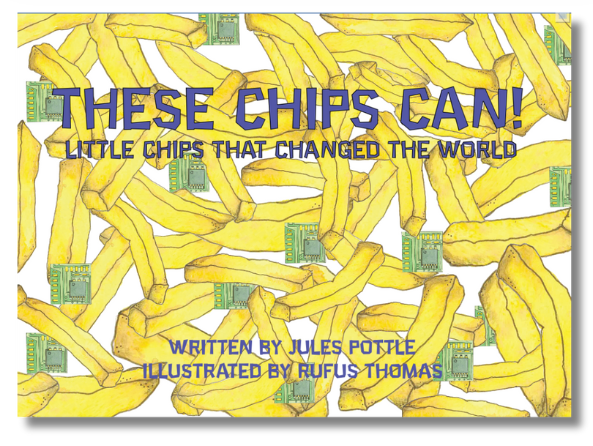Three guided enquires inspire young people to ask, investigate and share scientific questions. The Great Electricity Share resources were developed from partnership with the Diodes Incorporated, Oldham Enterprise Trust and Artful Fox Creatives.
Each enquiry is linked to the story of ‘These Chips Can! Little Chips That Changed The World’, written by Jules Pottle and illustrated by Rufus Thomas.
They provide teachers notes, a story-read video and links to GSSfS resources guiding pupils to work scientifically.
The Great Electricity Share inspires pupils to notice changes in electrical devices over the past 80 years. Pupils use their knowledge of simple circuits and investigate the effect of different components and how they affect the outputs.
Older pupils use their knowledge of circuits and micro:bits to design and make a fairground ride which lights up, moves, and is controlled.
Age: 5-7, 7-11, 11-14 years
Curriculum topics: working scientifically, electricity
Listen to the story, ‘These Chips Can! Little Chips That Changed The World’, read by the author, Jules Pottle
Important: The back pages of the book provide key information for a young person working with their teacher. The following slides incorporate this information which will support you to really embrace the power of the ‘These Chips Can!’ story. Download the slides and make the most of the book itself, with all of the most fabulous illustrations. You can get hold of the book here.
How has electricity changed the way we live?
Pupils consider how electricity has influenced the way we live, using the ‘These Chips Can’ book by Jules Pottle & Rufus Thomas. They consider chronology by using timelines to identify how technology has changed over time and make comparisons between ways of life in different time periods.
Working scientifically: Pattern seeking
How does the number of components affect the outputs in a circuit?
Pupils consider how electricity has influenced the way we live, using the ‘These Chips Can’ book by Jules Pottle & Rufus Thomas. They use and apply their knowledge of simple circuits to investigate the effect of different components to vary the outputs (lights and sound).
Working scientifically: Comparative and fair testing
How has electricity influenced our lives over the past 100 years?
Pupils use the story ‘These Chips Can’ to consider how daily lives have been influenced over time by electricity. They consider what electricity is, how daily objects - e.g. the telephone, light bulbs, street lamps etc. have changed over the past 100 years. Pupils begin to develop an appreciation of the influence of semiconductors and microchips and how these are used to develop increasingly faster and smaller electrical devices in our homes, transport and across industry. They are challenged to design and make a prototype fairground ride using circuits and BBC micro:bits to make it light up, move, and be controlled.
Working scientifically: Pattern seeking
This Great Guided Enquiry was developed in collaboration with Diodes Incorporated and the Oldham Enterprise Trust
Jules Pottle and Rufus Thomas are inspirational science communicators, using story and art to bring science to life for so many young people. Winners of the Association for Science Education Book Prize 2019 and 2023. Read more stories like These Chips Can! Little Chips That Changed The World from Artful Fox Creatives.
Now jump to other 2025 Great Guided Enquiries and Enrichment Activities






















